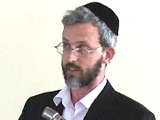- Sections
- Parashat Hashavua
- Torah Portion and Tanach
- Vayishlach
41
The middle letters of Yisrael form the word rosh (head). This symbolizes Yaakov’s desire to reach the head of his famous ladder. There are other, related, appropriate meanings. Head also symbolizes leadership, being the head and the first (rishon). For example, when Shimi ben Geira came to greet David when he returned from his exile during Avshalom’s rebellion, he is called the "rishon of the whole House of Yosef" (Shmuel II, 19:21).
The connection between leadership/strength and Yaakov’s new name is explicit, as the angel explains it: "… for you have acted with authority (sarita) with angels and people and have succeeded" (Bereishit 32:29; this pasuk can be translated in many ways). The root is found elsewhere in this meaning in verb form, as Avimelech is described as ruling over Israel for three years with the word "vayasar" (Shoftim 9:22).
In many ways, sin and shin are the same letter, so yashar (straight) is also a form of the same root. Shimshon, then, may have intended for a double entendre, when he asked his father to take for him a Philistine wife because she was yashar in his eyes (ibid. 14:3). He not only meant that he liked her but that she was his means of obtaining dominion over her people.
The meaning we would like to focus on is of yashar in the realm of ethics. Chazal call Sefer Bereishit, Sefer Hayashar, because the patriarchs were ethical. In one of the most uplifting sections in the Torah commentaries, the Netziv, Rosh Yeshiva of Volozhin (the greatest Torah center in Europe at its time), explained the difference between a tzaddik (righteous) and the preferable yashar.
The Netziv refers to the nation at the time of the destruction of the Second Temple as having many tzaddikim and people who were dedicated to Torah and its study, yet they were a difficult generation – these people were not yashar in the way they led their lives. Because of baseless hatred, they accused those who did not share their philosophy of being heretics, causing violence and discord, which led to the destruction. Hashem "cannot stand" such tzaddikim, and yearns for yesharim, truly ethical people, like the patriarchs. Even though the tzaddikim primarily acted with good intentions, Hashem was justified in bringing the destruction of the Temple.
The Netziv continues to point out that the patriarchs acted in good faith and with cordiality even with lowly idol worshippers, seeing them as partners in building the world. Avraham prayed for the people of Sodom, even though he hated them due to their wickedness. The midrash (Devarim Rabba 3:15) says that Avraham was chosen over all of the other righteous people because he tried to defend and find the good in all sorts of people.
So, Yaakov, who started off as "an unblemished man, who sat in tents" (Bereishit 25:27) was crowned as Yisrael, both tzaddik and yashar. May we merit leadership by people who are both tzaddikim and yesharim.

Parashat Hashavua: Did the Sinners from Gaza Convert?
Rabbi Yossef Carmel | Shevat 5785

Who Should Sanctify Hashem’s Name
Various Rabbis | 5769

Why Specifically a Matzeva (Monument)?
Rabbi Yossef Carmel | Kislev 4 5782

From Kriat Yam Suf to Yom Ha'atzma'ut
Rabbi Yossef Carmel | Iyar 4 5777

Tolerance but Not at All Costs
Ayn Aya Shabbat v, 73
Rabbi Ari Shvat | Iyar 5785

P'ninat Mishpat: Rental of an Apartment that Was Not Quite Ready – part II
based on ruling 82031 of the Eretz Hemdah-Gazit Rabbinical Courts
Beit Din Eretz Hemda - Gazit | Iyar 5784
Daf Yomi Makkot Daf 22
R' Eli Stefansky | 2 Iyar 5785








